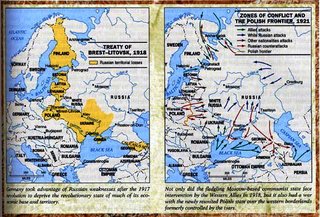
In the advanced capitalist countries the writing of Russian and Soviet history has for some time been possibly the most political and ideologically charged and biased of any historical subject matter. This is not to say that politics and ideology do not belong in history, they do. To deny or reject this is to deny reality, drain history of excitement, and create a false aura of objectivity. Ideology and politics, in history, as in science and society must be tested! Proposals and suppositions must be placed under scientific scrutiny, whether they are proposed by the left or by the right. I wish to promote theorizing about politics and ideology by an engagement with facts and analysis.
I propose here to detail several myths, fallacies, and stopgaps used in the historiography of Russia and the Soviet Union that prevent real analysis and thinking. By stopgaps, I mean words, phrases, or popular short hand that encapsulates an entire argument that is absent, assumed and never presented. The stopgap is a label, such as “totalitarian” that ends all consideration of counter facts, details, and history! It is a dismissive that ends discussion, to the detriment of thought. This brings us to our first fallacy.
Totalitarianism- this label whether used for the Soviet Union or Nazi Germany, its two most common uses, is purely ideological, used as a prop for western liberalism. By calling a nation totalitarian, we cut short analysis and research, and bring in elementary or sophomoric assumptions about the all controlling society, “Big Brother” and other literary allusions to the works of Orwell and Arendt. The use of totalitarianism is wrong and false for several reasons. First, totalitarian society does not exist. For example, classic Stalinist terror in the 1930’s was actually a response to not controlling the situation in the realm of the economy. Terror and coercion in this case was the ultimate expression of being out of control of the pace and contradictions of building massive industry, at a fantastical pace, with minimal assistance, and with ever rising and more impossible targets. Terror was the only way the bureaucracy saw that it could attempt to gain control of the situation it partially produced. Second, totalitarianism ignores the ways in which the order it is supposedly referring to is built using methods of cooptation, privileges, and terror, even under U.S. capitalism. Totalitarianism is always used for the other, never for one’s own country. (For a fuller discussion of this, see Slavoj Zizek’s Did Someone Say Totalitarianism? Verso 2001).
A second myth in what we might say in the bourgeois writing of Russian history is the use of the idea of the “golden mean,” closely linked to the totalitarian use above. The “golden mean” refers to the idea that going to the extreme either on the left or on the right leads to evil totalitarianism. Again, this is another crutch and justification for bourgeois democracy (control of politics by capital, occasional elections that determine who will oppress the masses now, a cooptation of workers organizations into the state, etc.) and usually ignores much of western history, inequality, racism, and brutality while extolling the benefits of “pluralist tolerance.” This tactic is employed against any radical program for the remaking of society towards greater equality and socialism by falsely identifying any methods that do not match methods employed in legal parliamentary politics with evil tyranny. At the very least, the golden mean is another ideological tool that that stops thinking, the conclusion is given before the facts. We want to start thinking! Real thinking requires systematic reading and argumentation not simple brainstorming some shreds of facts one has heard in the press or in popular consciousness. The golden mean is employed principally against the Bolsheviks during the revolutionary period to argue against the Bolshevik seizure of power and the dismissal of the Constituent Assembly. That these were necessary and vastly progressive acts in history is shown elsewhere, the point here is that the golden mean automatically gives the conclusion that these are bad practices because they violate parliamentary procedure, never mind that they were necessary to the salvation of the revolution, the ending of the imperialist war, and a step toward world socialist revolution. But,because they are labled as anti-democratic acts, the reader, naturally wants to be democratic and thus concludes that these practices are bad.
A third falsification in Russian history writing is the “magic bullet” of the “Russian Radical Tradition.” In short, the argument is that all Russian radicals share a messianic, anti-capitalist, primitivist, non-democratic, non-liberal, terror-embracing worldview. This is meant to include everyone from Hertzen, Bakunin, the Narodniks, to the Mensheviks and the Bolsheviks. This magic bullet is supposed to explain every twist and turn of the Russian Marxist and radical movement. Tactics, strategy, the actual conditions on the ground are secondary in this kind of analysis. Why did the Bolsheviks resort to terror? Because of the Russian radical tradition, of course! This is an anti-scientific, non-analysis. This is akin to explaining the recent fundamentalist religious revival in the U.S. by saying the Puritans founded the country! This should strike one as at least unsatisfactory and unscientific. Anti-Marxists to besmirch or belittle Karl Marx with a similar argument. It says his belief in the development of society and revolution is entirely a product of the messianic Jewish Rabbinical tradition, not the result of his years of careful study and argumentation, no.
I have encountered all of these arguments in textbooks, history books, the classroom, and in discussions with all sorts of people. The purpose here was to expose the ideological function of these arguments in putting down the struggle for socialism and supporting bourgeois democracy and often imperialist war. Be on the lookout for these arguments and recognize them as what they are, tools for stopping thinking and consideration and for forcing one to agree with capitalist politics.

5 comments:
Really good post.
I've posted about the misuse of the term fascist, just to mean a rightwinger you don't like. Liberals in the US, call Bush fascist. Trotsky was actually the first person to have a comprehensive definition.
good post. I think we really need too look at both sides of the history, not just American capitalist propaganda.
I agree that U.S. bias of the USSR was wrong, but I still do not lend my support to a dictatorship of any sort, espcially Stalinist Russia.
Good to have you back, Nicholas.
great post. I will link to your blog. Peace.
A very concise and interesting post. Well done comrade. Although I have to comment that "totalitarianism" was sadly used by Trotsky himself in "Revolution Betrayed".
Post a Comment